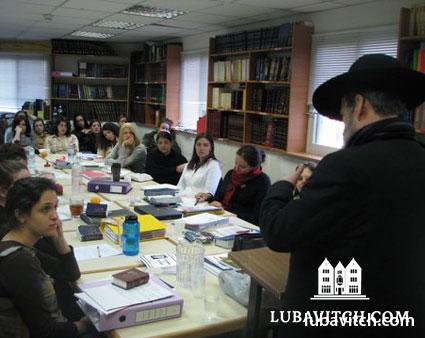(Lubavitch.com) Jenna Domber, a recent Ithaca College graduate with work experience in marketing and communications, used to “look into the observant world” with the belief that “women seem to be oppressed and have fewer rights.”
Still, when she decided to study Judaism in Israel, she chose an Orthodox institution – specifically, the Chabad-run Mayanot Institute for Women in Jerusalem. She picked Mayanot over other women’s beginner programs for its diverse course offerings, but one of the most powerful benefits, she now says, is that unlike many other programs for the newly-observant, the Mayanot faculty and staff never pressure students to marry quickly, or to lower their career ambitions.
“My understanding is that most women in the Chabad movement don’t go to college, but at Mayanot they understand the women coming here are very active in the secular world,” she said. “They are open and encouraging about it, and give us skills to access our spirituality in the context of our jobs.”
As for women’s participation in Jewish ritual, the text-based, highly academic study program at Mayanot convinced Domber that not all is as it seems. “Once I learned the reasons behind things,” she said, “not only are women not oppressed, but I’ve never felt more empowered to bring my gifts to the world – as a Jewish woman.”
Indeed the driving philosophy at Mayanot vis-à-vis women, careers, and ritual life – and one of the major “draws” for students — is that women are entitled to study Judaism’s classical texts, including Talmud, and to make decisions for themselves about how to apply what they learn.
While some other beginners’ seminaries lecture students on Jewish law and philosophy, and often push them to marry quickly, Mayanot’s curriculum teaches students to pick apart the ancient and Medieval texts which gave rise to Jewish laws and to make intellectual decisions based on first-hand experience with the primary sources.
“Not all seminaries believe that their graduates should return to university or even leave Israel,” said Mayanot’s Executive Director Rabbi Kasriel Shemtov. “We’re proud that those students of ours who were planning to attend graduate school still go. The ones who were starting careers still follow their plans. Our goal is not to convince people to change their dreams, but to infuse whatever they do with spirituality, to go out to the workplace and be a role model there of what it means to be a dedicated Jew, to turn one’s experiences in law school or in the business world into opportunities to bring more Torah into the world.”
Ilana Hecht, 25, made aliyah and became a full-time student at Mayanot after studying in California, Japan, and Russia. She was particularly touched that the Chabad-affiliated Mayanot administration encouraged her to follow her plan of volunteering for the IDF. “I was expecting opposition,” she remembers, “because there is a stigma for religious women to be in the army. But whenever I come back to the campus, [Educational Director] Rabbi Meir Levinger tells the other girls ‘this is Ilana. She used to study here, and now she’s serving the country.’ It makes me really happy. It wasn’t just a place of Jewish learning, it was a home.” She has chosen to express her Jewish identity by wearing a skirted uniform (rather than pants) whenever she is off her base; she also continues to attend shiurim at Mayanot and at other Torah institutions “all over Jerusalem.” Her future plans include the master’s program in East Asian Studies at Hebrew University.
Located in the charming Old Katamon neighborhood, the Mayanot women’s division re-opened one year ago, and in just twelve months has grown from a student body of 12 to an ever-changing, enthusiastic core of 45 part- and full-time students, despite the Gaza war. (The men’s division in the Makor Baruch neighborhood near Machneh Yehudah Shuk, has a student body of 80.)
Additionally, hundreds of participants of the Taglit-Birthright Israel program have taken classes at Mayanot as part of the “Taste of Jewish Learning” program.
The “old” women’s institute of the late 1990’s which was originally founded through the support of Founding Chairman, Rabbi Joseph Gutnick re-opened last January with a special grant from the George Rohr Charitable Entity in one building of what used to be the Machon Gold campus. The building, surrounded by trees and pre-1948 homes, contains a sizable Bet Midrash, classrooms, offices, and dormitory space.
Most of the students are new college graduates with a minimal background in Jewish education, said Rabbi Gestetner, Mayanot’s Dean, adding that they usually hear about Mayanot while on their Taglit-Birthright Israel trip, or from their campus Chabad rabbi or friends. What distinguishes Mayanot from other beginner-women’s programs, he said, is the unique combination of high-level textual study with significant study of Chassidut.
“Most of the students are either on a personal spiritual search, or they know what direction they want but need to increase their ability to study Hebrew texts,” he said. “This program is ideal for a student who is looking for depth in Judaism, who also does not want to sacrifice her intellectual integrity.”
"They don’t put you in a box or tell you to be a certain way,” concurred Lindsay Casper, 23, who studied at Mayanot in the first 6 months after it re-opened. “They don’t want you to give up your talents or what you love. That’s not a Lubavitch approach.” Rather, she says, "they expect us to take what we have, and cultivate it, and channel it in a Jewish way.”

Be the first to write a comment.